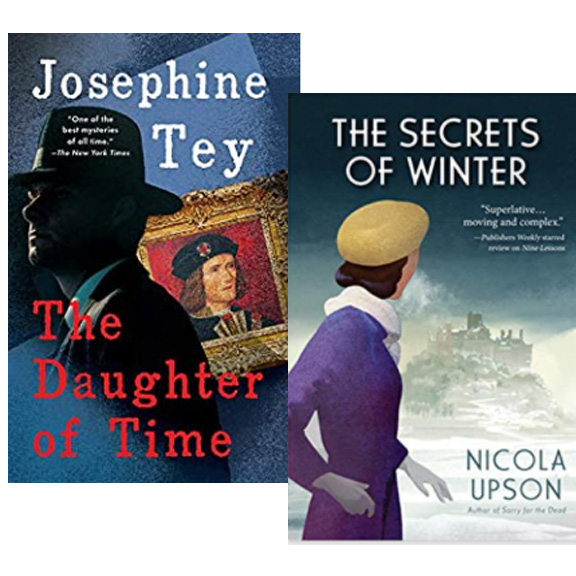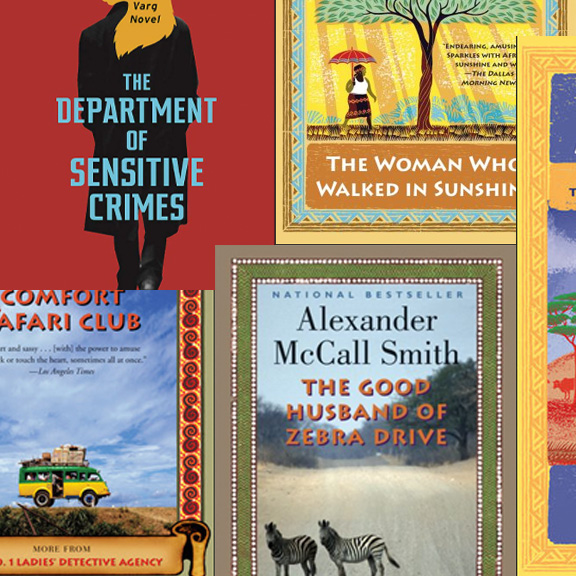
Mystery novels by Josephine Tey
&
the Josephine Tey mystery novels by Nicola Upson
I discovered Josephine Tey through Nicola Upson’s mystery series that feature Tey as an amateur detective. I only learned that Tey was a real person when I searched “Josephine Tey” at the library because I couldn’t remember Upson’s name.
Wait, what?
I didn’t realize Josephine Tey was a real person! I also didn’t know that all the books the character Josephine Tey writes in Upson’s novels are real books. THEY EXIST. I could read those too.
I’ll say it again: wait, what?
So for awhile I was binge reading both Tey and Upson’s books at the same time, constantly trying to pull apart the threads of fiction and reality.
I love Upson’s novels. They imagine the personality and life of a woman who was extremely private. They rely on her novels as much as the scarce known details of her life as scaffolding for a very rich rendering of an unconventional person.
I listened to the audio of a few of Upson’s books (read by the truly excellent Wanda McCaddon) and was addicted almost right away. They are solidly built intellectual mysteries, they feature a likeable main character and rich settings.
Tey lived during the first half of the 20th century. She was a playwright as well as a novelist. Maybe more of a playwright than a novelist. She moved between Scotland and England. Upson places her settings within these frames beautifully. The books explore the world of the theater, of post-war London, of an Alfred Hitchcock movie set, of the Scottish countryside and all are interesting. They describe in Tey a woman who supports herself with her writing (often under a pseudonym) in a world that is changing with a startling rapidity. These are my favorite kind of historical novel – the research is thorough and educational but doesn’t hit you on the head with a “Hey, appreciate all the research I did, writing is hard!” shaped stick. And the prose is just really fluid and beautiful.
And then there are Tey’s books. She was writing at the same time as Agatha Christie, but she is in many ways a renegade. She does wonderful things with the form. It’s as if she turned the thing – the thing that is the golden age detective story – over and over in her hands and then set it back down on the table in a different orientation. And that makes all the difference. When you’ve read/watched/listened to approximately 400 million mysteries, a little difference is significant – and significantly interesting.
And occasionally it wasn’t a little difference either. The Daughter of Time – the British Crime Writers’ Association once voted it greatest crime novel of all time – is truly a masterpiece and truly original.
The writing is intense and psychological. Sentences are beautifully and intricately woven, hanging together like a large piece of filigree.
Agatha was my first love. I fell for her mysteries in a way that changed the way I read forever. And versions of her stories are absolutely EVERYWHERE. I have watched even more Christie mysteries than I’ve read. But Josephine Tey’s work is a new (to me) and wondrous love and one that is somehow more wondrous because of how scarce her stories are. There are only eight mystery novels and the only movie adaptation I know of is the Hitchcock movie, but I believe that veers pretty widely from the original course.
If you don’t yet know either author, well then, I AM JEALOUS. And I don’t know which road forward to suggest.
A, you could proceed with order, read Tey’s Alan Grant novels in the order in which they were written. Read Miss Pym and Brat Farrar. Then dip into the Nicola Upson novels and decide what you think of the imagined life the contemporary author created for the historical one.
Or B, maybe do what I accidentally did, because it was kind of fun and trippy. Read them all out of order, sometimes two at a time, reading books as the library holds come in, overlapping the layers of fiction like a collage, getting dizzy with the immersion.
Either way, you have a lot of good mysteries ahead of you.

